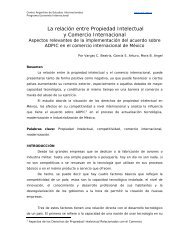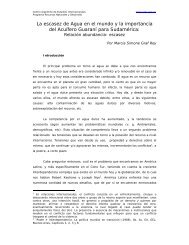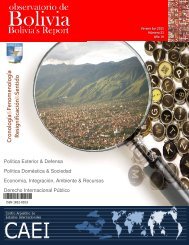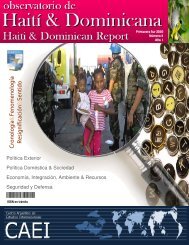Brazil's Defense Industry: The Emerging Transformational ... - CAEI
Brazil's Defense Industry: The Emerging Transformational ... - CAEI
Brazil's Defense Industry: The Emerging Transformational ... - CAEI
You also want an ePaper? Increase the reach of your titles
YUMPU automatically turns print PDFs into web optimized ePapers that Google loves.
of industrial indigenous capacity of building functional arrays of C5I, the paper considers a range of<br />
actual alternatives available for Brazil, serving as a venue in which to test the possible developmental<br />
effects of policy options. <strong>The</strong> case of Brazil shows that the transformation process is painful and<br />
prone to self-doubt.<br />
This analysis explores the intersection of strategy and policy formulation to enable greater real-time<br />
interaction between entrepreneurial business and defense strategy to enhance deterrence and war<br />
fighting capability. As the emerging regional leading power, Brazil may lose the opportunity to<br />
capitalize on the demands for defense capabilities and may forfeit the chance to build sustainable,<br />
affordable, and peaceful solutions that are both potentially advantageous to national security and<br />
developmental needs if action to achieve proposed goals is not immediately made.<br />
Devoid of the recommendations provided in this paper, Brazil will face inevitable collision of civil<br />
society interests, manifested in the industrial base, with military interests coalesced in the<br />
repotencialization of the Armed Forces. Paradoxically, without a regulatory executive agency, any<br />
compromise among these two actors will be detrimental for transparency and accountability,<br />
concurring with government inefficiency, strategic ineffectiveness and corruption.<br />
<strong>The</strong> research for building the conceptual framework presented in this paper almost exclusively from<br />
empirical material in study of aerospace, military, and maritime complexes from the regions of Sao<br />
Jose dos Campos, Sao Paulo, and Rio de Janeiro. <strong>The</strong>se regions are connected with reference to<br />
potential markets, labor resources, technology access and capital stock, raising no obstacles in the<br />
use of a common industrial complex approach.<br />
Conclusions and policy recommendations are primarily oriented to support government policymakers<br />
in developing stable and sustained responses to government defense planning and industry strategic<br />
planning. Although developed specifically for Brazil’s particularities, its concepts have the ambition of<br />
providing a general framework with worldwide application.<br />
Operational Definitions<br />
<strong>The</strong> relevant literature on <strong>Defense</strong> <strong>Industry</strong> and Regional Development offers a wide variety of<br />
definitions and methodological approaches for identifying <strong>Defense</strong> <strong>Industry</strong> Complex and Clusters.<br />
<strong>The</strong> relevance of geographic proximity of industries is long supported by economic theory. 2 Weber’s<br />
1909 book titled <strong>The</strong>ory of the Location of Industries recognizes spatial location as key variable for<br />
economy of scale. Marshall (1890) 3 is cited regarding the correlation between proximity of economic<br />
agents and economic productivity. Izard and Willey (1956) 4 coined the expression Industrial Complex<br />
2 Torre, A. On the role played by temporary geographical proximity in knowledge transmission. UK: Regional Studies,<br />
2008, vol. 42, nr 6, pg:869-889, 2008.<br />
3 Marshall, A. Principles of Economics. London: Mcmillan, 1890.<br />
4 Izard W. and Wiley, J. Location and Space-Economy. New York: Technology Press of Massachusetts Institute of<br />
Technology, 1956.<br />
3<br />
Todos los derechos reservados. - Pág. 3

















